A refrigerated truck is a closed box transporter for transporting frozen or fresh cargo, a refrigerated transport unit equipped with a refrigeration unit and a refrigerated transport vehicle for polyurethane insulation. It is commonly used for transporting frozen foods (refrigerated vehicles) and dairy products. (milk transport vehicles), fruits and vegetables (fresh goods vehicles), vaccine drugs (vaccine transport vehicles), etc.
structure:
The refrigerated truck is composed of the walking part of the chassis of the special vehicle, the heat insulation and insulation body (usually composed of polyurethane material, glass fiber reinforced plastic, color steel plate, stainless steel, etc.), the refrigeration unit, and the temperature recorder in the compartment, etc. For vehicles with special requirements, Such as meat hook car, can be installed meat hook, waist, aluminum alloy rails, ventilation slots and other optional parts.
Refrigerated car body production technology:
1. The “sandwich†board bonding method of split sheets is adopted by domestic large-scale refrigerated truck manufacturers. The refrigerated trucks produced using this technology have higher heat insulation performance.

2. Fragmented injection foam type.
3, the overall skeleton injection foam type.
4, vacuum adsorption paste
Refrigerator unit classification:
The refrigeration unit is divided into non-independent refrigeration units and independent refrigeration units. Domestic units and imported units. General models use external coolers, and a few mini-refrigerators use built-in coolers. For refrigerators with lower temperature requirements, a built-in cold plate (functionally equivalent to an evaporator) can be used.
classification
Classified by chassis manufacturer: Dongfeng Refrigerated Truck, Changan Star Refrigerated Truck, Qingling Refrigerated Truck, Jiangling Refrigerated Truck, JAC Refrigerated Truck, Beiqi Futian Refrigerated Truck
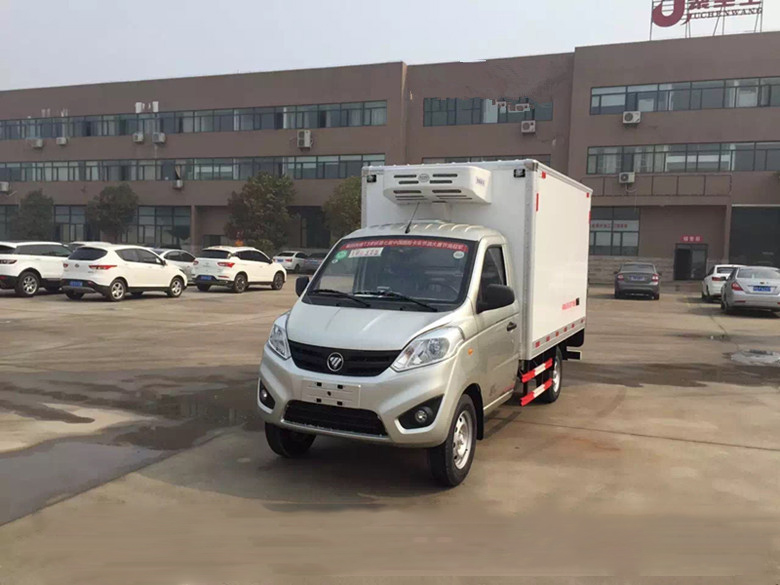
Classified by chassis load capacity: micro-refrigerators, mini-refrigerators, medium-sized refrigerated trucks, large-scale refrigerated trucks
According to the type of compartments: bread-type refrigerated trucks, van-type refrigerated trucks, semitrailer refrigerated trucks
development stage
The first stage
Integral injection of foamed metal skin structure. First-generation refrigerated truck manufacturers use this process. Due to the presence of a large amount of metallic materials on the car body, this product is easy to form a large number of cold bridges; on the other hand, the defects injected into the foam heat insulation layer are not easy to find, and the internal quality is not easy to guarantee; moreover, since the foam material is used for heat preservation The material is also used as a binder, which is prone to defects such as poor adhesion, and the heat insulation effect is not ideal, and the heat leakage rate (the thermal coefficient in the second stage) is high.
second stage
Integral injection of foamed glass steel structure. It is used in second- and third-generation refrigerator car manufacturers. This kind of product has improved one step on the basis of the first stage product, lighter weight, lower heat loss rate (thermal conductivity), better insulation effect, but there are defects such as poor adhesion, easy-to-debride foaming on the outside of the compartment.
The third phase
Fully enclosed polyurethane plate bonded glass steel structure. It is used in second- and third-generation refrigerator car manufacturers. This product is light and leaks heat
"sandwich" structure
(The thermal conductivity) is low and the insulation effect is good. The unsaturated polyester resin is used as a binder, and a cushion layer is further added. The rigid polyurethane foam for the heat-insulating material has low thermal conductivity and high strength. The plate is bonded with a high-strength, high-seal adhesive to form a unitary body. The only drawback is that the loss after the polyurethane cutting is relatively large, so the material cost is higher. Especially in the current situation of high prices of chemical raw materials, the cost of production of cars is getting higher and higher. This structure of the refrigerated truck is dominant in the domestic and foreign markets and is also a process used by our country's refrigerated truck manufacturers.
Features
Hermetically sealed reefer truck containers need to be tightly sealed to reduce heat exchange with the outside world to keep cooler temperatures within the freezer.
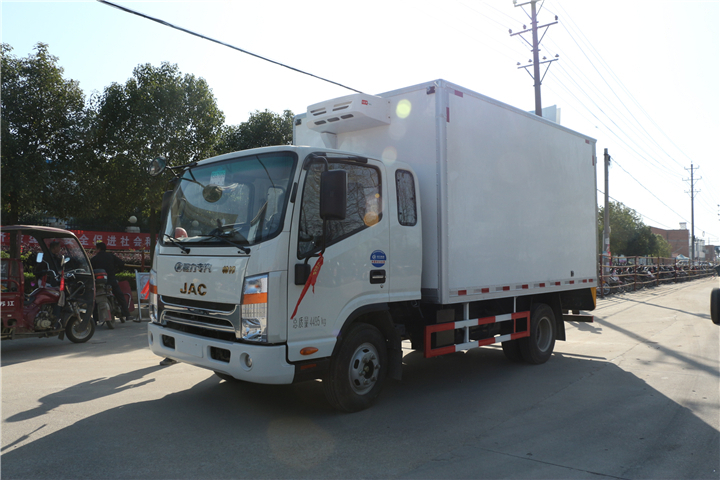
Refrigerated retrofitted refrigeration equipment communicates with the container and provides continuous cooling to ensure that the temperature of the container is within the allowable range of the cargo.
Lightweight Generally, goods transported by refrigerated trucks are items that cannot be stored for a long period of time. Although there are refrigeration equipment, they must be delivered to destinations quickly.
Containers of insulated refrigerated trucks resemble containers, but are made of materials with better heat insulation effect, which reduces heat exchange.
Key equipment
1. Refrigeration vehicle refrigeration unit
Refrigerated vehicle refrigeration unit: Provides an endless stream of "cold" important equipment for refrigerated trucks. It is generally installed at the top of the front of the container and has the appearance of an air conditioner, but it has stronger cooling capacity than the same volume of air conditioners.
Refrigeration units are generally divided into two types: stand-alone units and non-independent units. The difference is that the independent units generate power for maintenance by completely using another unit. The non-independent units are fully powered by the engine's engine work to drive the group. Refrigeration work.
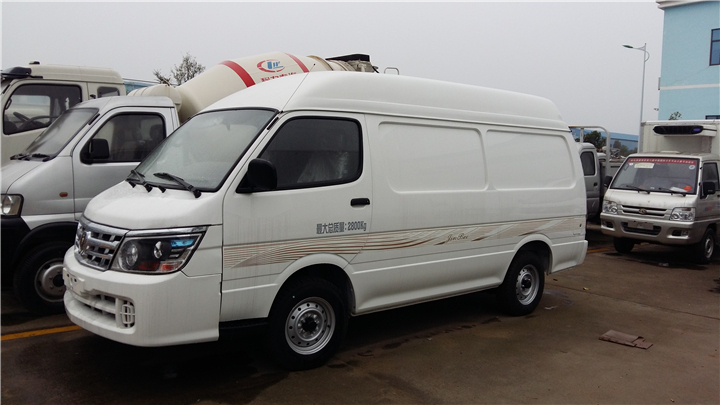
The choice of refrigerating vehicle refrigeration unit
Generally, the refrigeration units with different power refrigeration capacities are selected according to the volume of the refrigerator body and the requirements for the temperature of the transported cargo.
2 refrigerated car insulation body
The refrigeration unit of a refrigerated truck is used for temperature control, and the role of the car body is to maintain the temperature. If the refrigeration unit is the provider of energy, then the car body is the reservoir of energy. Among the three components of refrigerated trucks, the refrigeration unit and the insulated car body are the most important. The removal of the chassis can be used as a small thermal insulation and cold storage.
Choice of insulation box
The choice of car body generally follows several points: good insulation performance, light weight, and not easy to damage.
GPS
The refrigerated transport vehicle location management system is an open positioning supervision platform integrating GPS/temperature detection technology, electronic maps and wireless transmission technologies. Realize effective tracking and positioning management of refrigerated truck resources, and integrate positioning information with business resources of the company. The refrigerated truck location management system not only provides an efficient and flexible management tool for refrigerated enterprises and field staff, but also creates a new and efficient scientific model for refrigerating enterprises to manage and control the refrigerated vehicle resources. This product is suitable for the collection, transmission, recording and over-limit alarm of temperature data in refrigerated compartments. It is an ideal tool for temperature monitoring of transport carts/goods in the refrigeration industry.
In response to this, according to the specific needs of enterprises has developed a "RFID cold chain temperature management system" and "GPS + temperature monitoring cold chain management system." Through the combination of advanced RFID technology, GPS technology, wireless communication technology and temperature sensing technology, temperature changes are recorded in the logistics management and production process management of fresh foods and pharmaceuticals that require proper temperature management to ensure quality. "RFID tags with temperature sensors" or "real-time" through the "terminal with GPS and temperature sensing capabilities combined with wireless communication technology upload" to the company's management platform, detailed, real-time product freshness, quality, Management. It is simple and easy to solve the problem of quality control in the food distribution process.
RFID tags mainly have the following advantages: RFID tag data storage is large, can be reused, the use of low cost, easy operation, read and write within 30-100 meters long distance; through RFID tags, can be monitored to a different container Different temperatures of packaging units; RFID tags provide ID code, and can continuously record temperature data, have accurate time records, easy to define the delimitation of duty, trace information on aspects, and can quickly grasp the temperature status of the most important transportation in raw freshness management. And to promote the improvement of freshness management in the circulation process; RFID can also be expanded to establish a cold chain detection center platform that covers the whole cold chain process by enterprises or alliances; automatically notify the door opening and automatic registration in the unloading area; effectively manage truck traffic, Real-time monitoring of incoming and outgoing status; shortening waiting time and improving the efficiency of operations; optimizing truck traffic management, thereby accelerating the logistics process of JIS and JIT; reducing the loss of products, improving the safety of product transportation, and improving corporate profits.
The refrigerated transport vehicle location management system will provide an effective and beneficial success paradigm in assisting China's logistics industry to break through the bottleneck of the existing monitoring technology and establish an effective cold chain logistics management method.
market outlook
With the development of market economy and increasingly fierce market competition, some professional sub-producers have gradually demonstrated their advantages in occupying the market with their high level of technology, good product quality, advanced management methods and sales services. Henan Bingxiong, Hubei Chengli, and Jinan Kagel have become China's leading players in the refrigerated truck industry. Some of the refrigerated truck manufacturers that are concurrently working under the guidance of the development strategy of many varieties and small batches will play a role in supplementing and supplementing the market, and will have a positive impact on the development of the industry.
In general, the concentration of production will continue to increase. It can be expected that some key enterprises with production and sales volume of 20%-30% will emerge. The rapid development of professional car-plate plants and refrigeration unit production enterprises has made up for certain deficiencies of refrigerated truck factories, avoided the phenomenon of blindly setting up stalls and repeating projects, and played a positive role in controlling scattered, chaotic and poor conditions.
Operation method
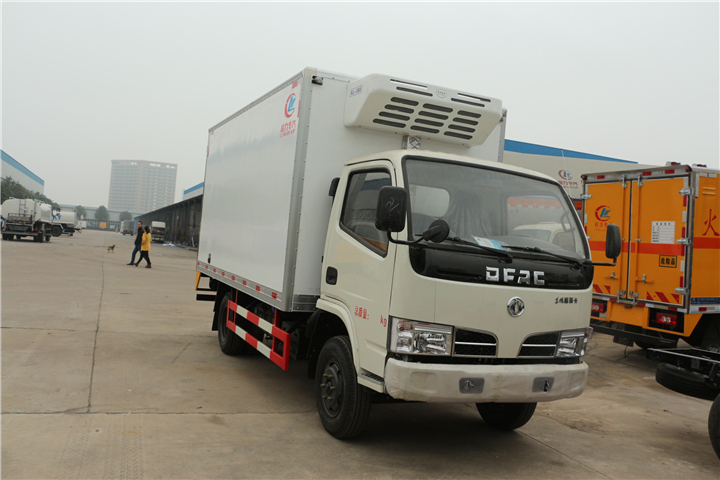
Only the correct use and operation of a refrigerated truck can guarantee the complete delivery and preservation of the goods. Because refrigerated trucks are used exclusively for temperature-sensitive products, the guarantee of temperature is the key to refrigerated trucks. Improper use or improper operation can result in the goods not being stored or shipped in good condition.
Preventive maintenance
In our normal use, maintenance and maintenance of vehicles and chillers are inseparable. Only when the equipment is properly maintained and maintained on time, the normal use of the equipment can be guaranteed and the service life of the equipment can be extended. Usually, the chassis engine is maintained and maintained according to the mileage, while the refrigeration unit is designed to maintain and maintain according to the engine operating hours. The normal refrigeration unit is 500-700 hours for maintenance and maintenance. It needs to replace the oil filter, fuel filter, and air filter; and pay attention to check the tightness of the belt, whether the cooling system leaks, etc.; some brands of refrigeration units (such as the United States cold Wang) In order to meet the needs of environmental protection, minimize damage to the environment and reduce the emission of harmful substances, synthetic or semi-synthetic motor oils are used instead of ordinary engine oils to extend the maintenance time of the engine. Maintenance is usually done in 2000 hours. As a result, the waste of used motor oil is reduced. In addition, scientific experiments show that by using this high-end engine oil, not only the wear of the engine is reduced, but also the fuel consumption of the engine can be reduced.
How to maintain a refrigerated truck?
As a special vehicle, a refrigerated truck has some matters that must be taken care of before driving to prevent unnecessary trouble during driving. The following inspections are recommended before every loading of cargo.
1. The refrigerated vehicle fuel diesel or gasoline supply must be sufficient to ensure that the engine runs to at least the next checkpoint.
2. The refrigerating car engine oil engine oil level is supplied at the (full) mark, do not overfill with oil (changed once a year).
3. Refrigerant truck coolant Check the coolant level gauge to see if the amount of coolant is correct and the pointer should be within the white range. If the coolant level is in the red range, add coolant to the coolant tank. Usually the coolant is a mixture of ethylene glycol and water (according to the actual situation of the product used in different proportions), and should provide protection to -34 °C without freezing. Note: Do not open the lid of the coolant tank when the coolant is hot.
4. The battery terminal of the refrigerated truck must be firm and not corroded. The electrolyte should be at the full mark.
5. Belt straps must be good and adjusted to the appropriate degree of swell. The 13mm sag across the center between the pulleys.
6. Electrically inspect all electrical connections in the electrical control circuit to ensure they are securely fastened. Wires and terminals should be free from corrosion, cracking or moisture.
7. Structure Visual inspection of the unit for leaks, loose parts or breakages and other damage.
8. The gasket of the gasket unit should be tightly pressed and in good condition.
9. Refrigerated car coil condenser and evaporator coil should be clean and free of dirt.
10. Defrost Drain Check defrost drain hoses and fittings to ensure they are free.
11. The cargo can not block the evaporator outlet and return air inlet when loading the cargo compartment, and maintain the cold circulation of the cargo compartment to ensure that there will be no hot spots in the compartment.
Therefore, scientific maintenance and maintenance can not only ensure the integrity of equipment, but also reduce operating costs.
Suitable packaging
For non-ventilated containers for refrigerated goods, side-ventilated containers for fresh produce. The box must be compressive.
Because the frozen goods do not allow the wind to blow from the surface, because the wind blows over the surface of the frozen goods, the moisture in the goods will be lost and the quality of the goods will decline. This year, our country has formulated "on the bulk frozen foods are not allowed to sell", there must be packaging sales is the reason. Due to its own characteristics, fresh products are still in a breathing state during storage and transportation. If they are not well ventilated, the goods will be deteriorating. Therefore, it must be ensured that such goods have good ventilation and ventilation (installation of ventilation slots in the compartment).
set temperature
Set the thermostat to the required temperature and pre-cool the car for 1.5 hours to drain the heat remaining in the car; when loading, the refrigeration unit will be turned off and the cargo will be loaded quickly.
When loading, the compartment must be pre-cooled or warmed up. Because the vehicle is parked in the open air, the temperature of the passenger compartment is usually the ambient temperature. If the temperature of the conveyed goods is not ambient temperature, the goods are loaded into the car, and the ambient temperature will affect the temperature of the goods being transported, resulting in a change in the quality of the goods being transported. Therefore, the car must be pre-cooled to the required temperature before loading. However, the refrigeration unit must be turned off at the time of loading (unloading). Many people do not shut down the refrigeration unit when loading or unloading goods. In fact, this is a very wrong operation.
The reason is: When we precool the cabin, if it does not shut down, open the door of the car, because the fan of the evaporator of the refrigeration unit is working, the front of the fan is positive pressure, and the back is negative pressure, so the cold air from the upper part of the car Blow out, while the lower part will quickly inhale hot air from outside, resulting in a rapid rise in the temperature inside the compartment; if you load and unload cargo after the shutdown, because the fan is stopped, the air flow stops, the air pressure inside and outside the compartment is the same, which makes the external heat The speed at which air passes into the cabin is relatively slow.
Pre-cooling insulation
The goods must be precooled to the required temperature and the temperature of the goods checked at the time of loading; the refrigeration unit is used to maintain the temperature of the goods, not to reduce the temperature of the goods.
Many users of refrigerated trucks have a wrong concept. It is always believed that the refrigerating unit on a refrigerated truck can freely freeze or heat the cargo loaded into the carriage to its desired temperature. Therefore, the goods that are insufficient for the transport temperature are loaded into the carriage, and the refrigeration unit is set to its required transportation temperature, and the temperature of the cargo is lowered or raised to its desired temperature over a certain period of time. However, the opposite is true. Not only does the temperature fall (or does not go up), the cargo damages or deteriorates. Because the refrigeration unit of a refrigerated truck does not lower the temperature of the goods, but maintains the temperature of the goods, he packs the goods just like the quilts we used to sell cold drinks. When the external cold (heat) source passes radiation, conduction, and convection into the cabin, it is carried away by the cold air blown by the refrigeration unit and the heat source is cut off from the cargo.
Therefore, at the time of loading, the temperature of the loaded goods must be measured first. If the set point temperature of the refrigeration unit is higher or lower than the cargo temperature, the temperature of the cargo in the compartment is difficult to reach the required temperature for transportation. The storage temperature and the transportation temperature of the goods must be the same. If the temperature of the goods changes frequently, the water will be lost, which will cause the quality of the goods to change, which will lead to a shortened shelf life of the goods.
Prevent blocking
Even if the capacity of the unit exceeds the actual requirement, insufficient air circulation will be the main cause of the deterioration of the goods; any obstruction around the cargo may lead to “hot spotsâ€.
A qualified refrigerated truck must ensure that there are good ventilation on the six sides of the carriage and there is no obstruction on the six sides of the cargo; good air circulation can ensure that the goods are transported under the proper temperature requirements. The cold (hot) gas blown by the refrigeration unit isolates the cold (hot) source that enters the compartment from the outside and protects the cargo. If a blockage occurs at one location, the cold (heat) source in this section will directly enter the item, causing the cargo temperature to change. Make sure that the return air shutter is in good condition; do not block the inlet of the evaporator (return air); insufficient return air will cause irregular circulation of the cold air and cause the top cargo to freeze.
Precautions
The goods must be stacked on double-sided pallets; the fresh-keeping pallets must not contain the picking film, and the film will block the circulation of cold air to the goods; the floor under the goods cannot be blocked.
The general refrigerated truck floor uses vented aluminum rails; however, some refrigerated trucks do not have aluminum rails, and flat anti-skid floors are used. The non-slip floor is usually used as a third-party transportation company or a company transporter for dairy products. The purpose is to be suitable for the transportation of multiple products or to facilitate the cleaning of the ground. However, it must be noted that the loading must be done with double-sided pallets to ensure the circulation of cold air on the ground. It is forbidden to stack goods directly on a flat floor.
Do not stack cargo in front of the evaporator outlet, as this will impede the cold airflow; obstruction above the cargo will cause a short circuit in the cold air flow. Maintain a minimum distance of 225 mm between the top of the cargo and the roof.
When loading, do not stack the cargo too high. Make sure that the loading height is not higher than the level of the outlet. If the front of the air outlet is blocked by the goods or is too close to the goods, it will not only affect the storage and transportation temperature of the goods, but also affect the normal operation of the refrigeration unit.
Because the air outlet is blocked by the cargo, the cold air (or hot air) cannot be circulated in the compartment normally, thus causing the local temperature of the cargo to rise.
On the other hand, some defrosting designs for the refrigeration unit use air-induced defrosting. When the goods are too close to the air outlet, the coil in the evaporator of the unit will quickly frost (or ice), the air-sensitive switch will immediately operate, the unit will quickly enter the defrosting state; when the coil temperature rises to 9 degrees (design temperature) About, defrosting ends immediately. As a result, the above-mentioned operation of the unit will be reciprocated, resulting in a phenomenon in which the temperature in the passenger compartment does not fall. The intuitive feeling for everyone is that the unit is always defrosting frequently. In fact, it was caused by too much (more) cargo.
keep clean
The interior of the compartment must be kept clean; there should be no wrapping paper or paper scraps on the floor; debris can impede the flow of air or be inhaled by the evaporator.
When using a refrigerated truck, the interior of the compartment should be kept clean. Due to the effect of the evaporator fan, air circulates in the compartment, causing ground shreds or dirt to be drawn into the evaporator fan. For a long time, a large amount of impurities will be sucked into the evaporator coil, affecting the cooling effect of the refrigeration unit. Because the coil is surrounded by a little bit of impurities, the heat exchange rate of the coil decreases. Therefore, after a few years of use, refrigerated trucks will feel that the cooling effect is worse than the beginning. Besides the cause of the malfunction, it is because the coils are too dirty. Therefore, ensuring the cleanliness of the ground in the carriage is the key to ensuring the normal operation of the refrigeration unit.
Properly handled
When the door is opened, the freezer should be closed; the opening time of the door should be as short as possible; use bar-type curtains as much as possible when loading and unloading goods. Use partitions to separate dry goods (empty baskets) and perishable items.
In order to ensure the temperature of the goods in the carriage, for the delivery vehicles in the city, it is recommended to use a strip curtain to ensure that when the cargo is unloaded rapidly (when the refrigeration unit is not closed), the cold air in the carriage will not be quickly lost.
Different temperature goods are forbidden to be stored in the same compartment space. Should be separated by partitions. Because the freezer is used to maintain the temperature of the goods, not to cool down, mixing goods of different temperatures will affect the temperature of the goods and affect the quality of the goods.
Correct operation and use of refrigerated trucks is the key to ensuring the quality of temperature-controlled goods. It also ensures that the refrigeration equipment can work properly.
select
The first is the chassis of the car:
Tonnage, road conditions, etc. of the cargo, considering the structure and carrying capacity of the chassis, fuel economy, emission standards, etc.
Compared with the choice of ordinary truck chassis, refrigerated trucks also need to focus on the stability of the chassis, refrigerated trucks are generally transported goods can not be stored for a long time, even if there is refrigeration equipment, still need to reach the destination faster. At the same time, refrigerated goods have higher requirements for the transport environment. If there is a failure on the road, the goods will deteriorate and the loss will be very high.
The second is the choice of the body:
The body of a refrigerated truck is different from an ordinary van, and it needs good sealing performance and heat insulation effect, so as to ensure that the refrigerated cargo is in a stable temperature environment.
The design of refrigerated compartments is mainly airtight and heat-preserving. Generally, the structure of refrigerated trucks adopts a three-layer structure. The inner and outer skins are made of composite materials, such as glass steel plates, color steel plates, and aluminum alloys. The inner plate material should be made of different materials for transporting different goods. The most expensive inner material plate should be a stainless steel plate. The middle sandwich is a heat-insulating material, and polyurethane foam is mainly used. On the four sides, the glass plate and the polyurethane foam are bonded together with a high-strength adhesive to form a closed plate.
In addition to materials, the thickness of the cargo compartment also determines the effectiveness of the insulation. The thicker the insulation layer of the cargo compartment, the better the insulation effect. However, the space inside the cargo compartment will be reduced, and the load of the cargo will be reduced. Users need to follow their own actual conditions. Need to choose the appropriate thickness.
Then there is the choice of refrigeration units:
Among the three components of refrigerated trucks, the refrigeration unit is the most important part. Because of the small space in the cargo space, the technical requirements for controlling the temperature are also higher.
Say good goods are not cheap, the price of imported refrigerators is also very expensive, like the kind of semi-hanging refrigerated truck imported refrigerators, the new cheapest is also more than 100,000. In contrast, domestic brands have obvious advantages in terms of price. For users who pay attention to prices, domestic brands are also a good choice.
The power source of the refrigeration unit can be divided into two types: independent and non-independent units. The independent unit has a separate power source. The diesel engine of the unit itself is used as its power source; the power output of the non-independent unit is based on the chassis of the car. Driven by the engine.
From the standpoint of cost, the difference between the price of non-independent chiller units and independent chiller units is more than tens of thousands. If the budget is relatively abundant, and the temperature requirement in the vehicle compartment is relatively low (the required temperature is at least minus 10 degrees below), it is still recommended. It's better to use a standalone style.
Cold storage instructions
In life, many cargoes need to be frozen and refrigerated. Therefore, people have installed cold storage on transport vehicles. This is the appearance and development of refrigerated trucks and refrigerated trucks. It facilitates the refrigerated storage of goods during turnover. .
Today, many large and medium-sized cities use refrigerated trucks for cargo transportation. However, its industry penetration rate is very low. Every year, there are still a large number of food, meat, fruits, vegetables, medicines, alcohol, etc., which cause unnecessary losses due to deterioration in the transportation process. This is more indicative of the fact that there is a lot of cold storage. In the large development market, the cold storage industry also has a wide range of ways to expand in this area.
The restriction on the storage of traditional cold storage vehicles by refrigerated trucks is a great supplement, greatly optimizing the flexibility of cold storage development and developing new channels and space for the development of the cold storage industry. Therefore, while encouraging the promotion of the construction of cold storage, the government must also vigorously publicize the popularity of refrigerated trucks to make up for unnecessary losses caused by the long-distance turnover of goods.
Maintenance and Maintenance of Refrigerated Car Insulation Car Body
When it comes to refrigerated trucks, in fact, I often say that under the premise of stable operation of the refrigeration unit, it can provide stable cooling conditions, so how to maintain the continuous temperature is also very important. In the previous section, I mentioned that most of the material of the refrigerated car's heat preservation box is selected from the inside and outside of the FRP panel, because the FRP panel has unique advantages.
In general, the daily maintenance and maintenance of the refrigerated car insulation body is mainly reflected in the inspection of the exterior surface of the car body, the inspection of the internal surface of the car body, the inspection of the internal and external edges and corners of the car body, the inspection of the interior floor of the car body, and the internal lighting and cooling. Vents and so on. For the exterior surface of refrigerated compartments, I often remind the users who come to our factory to not scrape the car. This reduces the ability of FRP to withstand pressure and is more prone to aging and deformation. On the other hand, internal filling will occur. Polyurethane leaks and affects the insulation of the car.
For the maintenance of the interior surface of refrigerated trucks, the temperature control must be adjusted to prevent the surface of the car from icing. If the air humidity is relatively high, it is necessary to pack the refrigerated products as much as possible, especially for aquatic products, and the package is sealed so as to reduce the moisture content. Evaporation inside the cabin reduces the possibility of ice inside the refrigerated truck. If there is a layer of ice on the inner surface of the refrigerated truck, it must be removed with a de-icing shovel in time after each shipment to prevent the thickening of the ice layer. This not only affects the storage space of the car, but also increases the vehicle's storage capacity. Self-respect, increase fuel consumption. Internally, care should also be taken to avoid damage to the inner surface of sharp goods or containers.
Last but not least, I also mentioned the maintenance and maintenance of internal electrical equipment, because the electrical equipment of the refrigerator body is in a relatively high humidity and low temperature environment. To prevent the occurrence of various short-circuits caused by the exposed power cord, it is necessary to prevent unnecessary heat damage caused by alternating hot and cold lighting equipment.
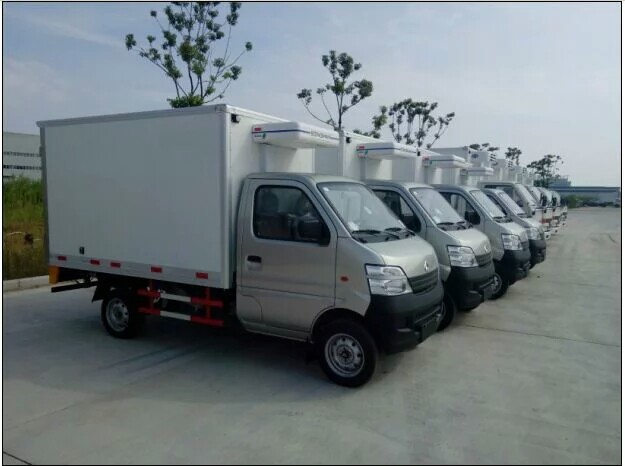
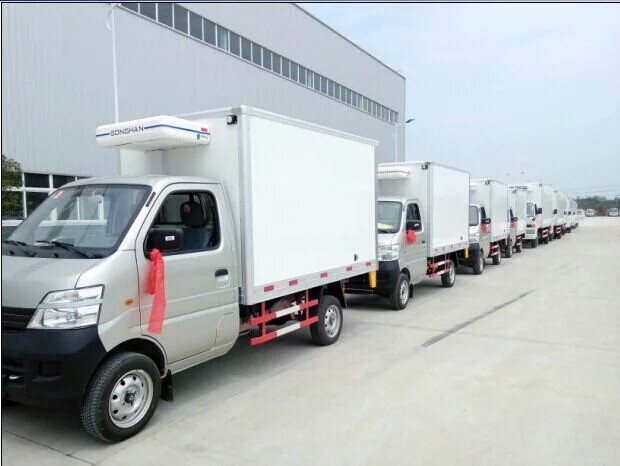
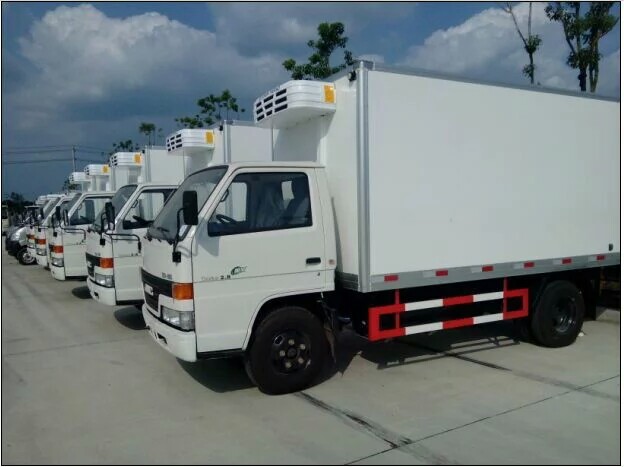
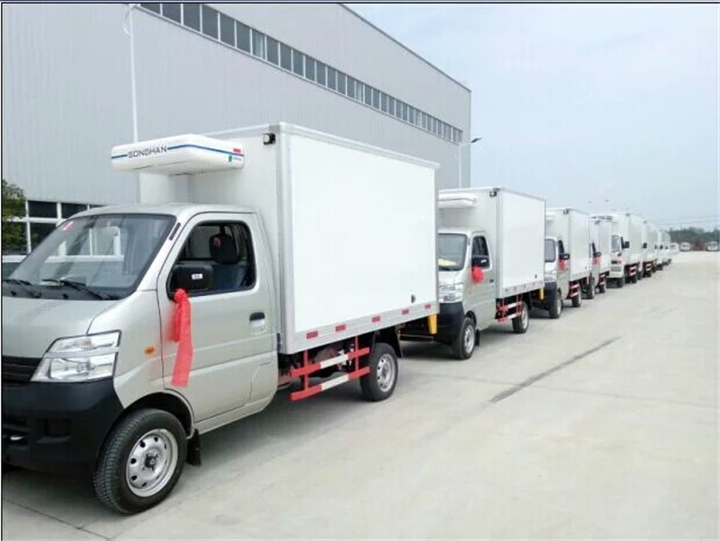
QQ consultation
Sales hotline / Guo total
fax
Website:
Address: Suizhou Southern Suburbs Pinggang Chengli Automobile Park
A pallet truck is a light and small handling equipment with two cargo-like legs. Can be inserted into the free fork hole of the pallet. Widely used in loading, unloading or handling operations.
Semi-electric lifting truck, manual truck, fully automatic lifting truck
Taixing Jinlong Rubber Rollers Co., Ltd. , https://www.jinlongroller.com